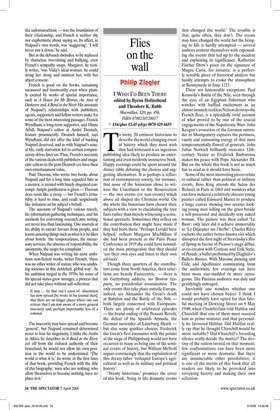Flies on the wall
Philip Ziegler
I WISH I’D BEEN THERE edited by Byron Holinshead and Theodore K. Rabb Macmillan, £20, pp. 456, ISBN 9780230528017 ✆ £16(plus £2.45 p&p) 0870 429 6655 To invite 20 eminent historians to describe the world-changing event in history which they most wish they had witnessed is an ingenious publishing idea likely to produce an entertaining and even modestly instructive book. Happy evenings could be spent around the dinner table debating the choices and suggesting altematives. It is perhaps a reflection of contemporary society, for instance, that none of the historians chose to witness the Crucifixion or the Resurrection — the two events (or non-events) which above all shaped the Christian world. On the whole the historians have chosen their subjects with a view to elucidating the true facts rather than merely witnessing a sensational spectacle. Sometimes they reflect on the contribution they might have made if they had been there. ‘Perhaps I could have helped,’ reflects Margaret MacMillan: if she had been present at the Paris Peace Conference in 1919 she could have reminded the main protagonists that they should ‘use their own eyes and listen to their own advisers’.
Though three quarters of the contributors come from North America, their selections are heavily Eurocentric — there is no Gettysburg address, no Boston teaparty, no presidential assassination. The only events that take place outside Europe, indeed, are Alexander the Great’s death at Babylon and the Battle of the Nile — both largely concerned with Europeans. There are plenty of celebrated episodes — the brutal ending of the Peasant Revolt, the defeat of the Spanish Armada, the German surrender at Lüneburg Heath — but also some quirkier choices. Frederick the Great’s first encounter with the potato at the siege of Philippsburg would not have occurred to many as being one of the seminal events of history, but William McNeill argues convincingly that the exploitation of this dreary tuber ‘reshaped Europe’s agricultural as well as its military and political history’.
‘Twenty historians,’ promises the cover of this book, ‘bring to life dramatic events that changed the world.’ The trouble is that, quite often, they don’t. The events may have changed the world but the bringing to life is hardly attempted — several authors content themselves with expounding the events that led up to the incident and explaining its significance. Katherine Fischer Drew’s piece on the signature of Magna Carta, for instance, is a perfectly sensible piece of historical analysis but hardly attempts to evoke the atmosphere at Runnymede in June 1215.
There are honourable exceptions: Paul Kennedy’s Battle of the Nile, seen through the eyes of an Egyptian fisherman who watches with baffled excitement as an almost insanely reckless Nelson destroys the French fleet, is a splendidly vivid account of what proved to be one of the crucial engagements of the Napoleonic Wars. John Keegan’s evocation of the German surrender to Montgomery captures the pettiness, vanity and consuming energy of that most temperamentally flawed of generals. John Julius Norwich brilliantly recreates 12thcentury Venice as Frederick Barbarossa makes his peace with Pope Alexander III. But on the whole this book is not as much fun to read as it should have been.
Some of the most interesting pieces relate to cultural rather than political or military events. Ross King attends the Salon des Refusés in Paris in 1863 and wonders what can have induced a relatively obscure young painter called Edouard Manet to produce a large canvas showing two serious looking young men lolling on the grass beside a self-possessed and decidedly sexy naked woman. The picture was then called ‘Le Bain’; only later did it achieve immortality as ‘Le Déjeuner sur l’herbe’. Charles Riley eschews the rather better-known riot which disrupted the first night of Stravinsky’s Rite of Spring in favour of Picasso’s stage début, as co-creator with Cocteau and Erik Satie, of Parade, a ballet performed by Diaghilev’s Ballets Russes. With Massine dancing and Gide and Apollinaire commenting from the auditorium, few evenings can have been more star-studded or more outrageous. The Parisian audience was duly and gratifyingly outraged.
Inevitably one wonders whether one could not have chosen better. I think I would probably have opted for that fateful meeting in Downing Street on 9 May 1940, when Chamberlain told Halifax and Churchill that one of them must succeed him as prime minister and that personally he favoured Halifax. Did Halifax really say that he thought Churchill would be more suitable? Did Churchill’s brooding silence really decide the matter? The destiny of the nation turned on that moment; few confrontations can have been more significant or more dramatic. But there are innumerable other possibilities; it is one of the merits of this book that all readers are likely to be provoked into reviewing history and making their own selection.


































































 Previous page
Previous page